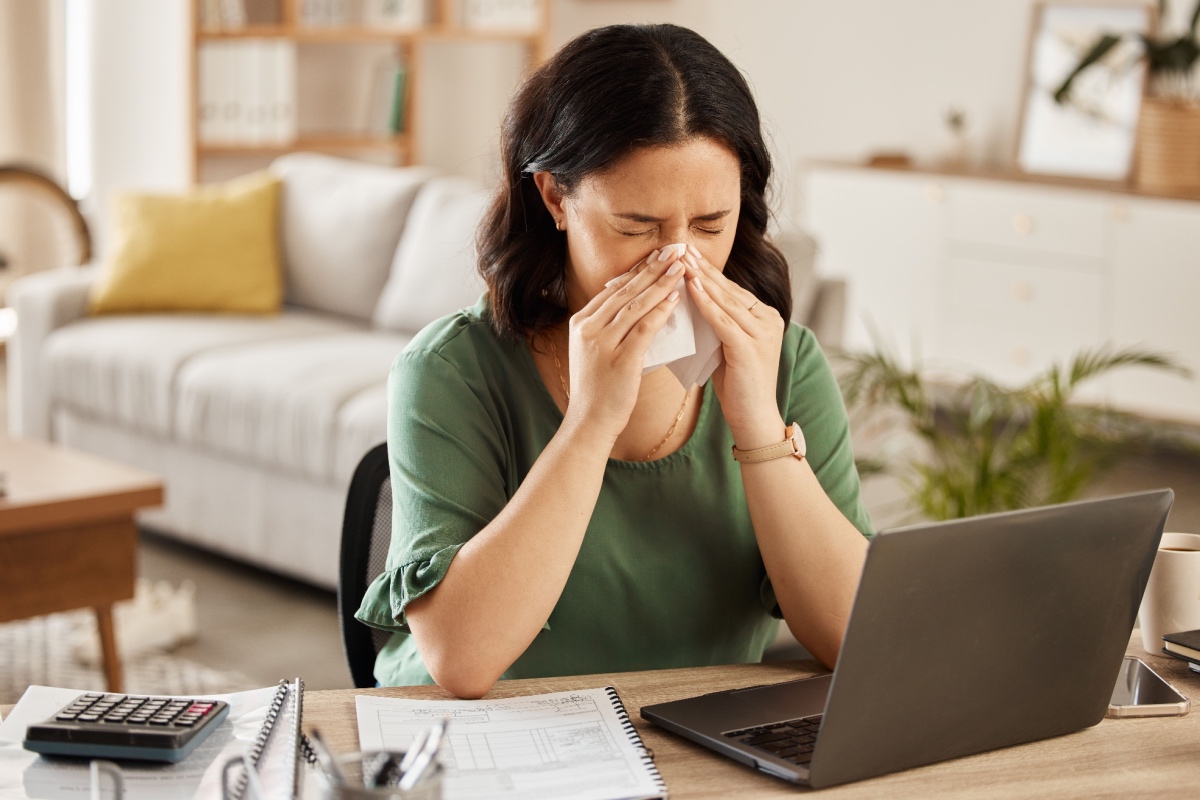Spring brings longer days, warmer temperatures, and colorful blooms. However, for many people, it also means an increase in allergy symptoms. Pollen, dust, and other airborne particles can make it difficult to enjoy the season, triggering sneezing, itchy eyes, congestion, and respiratory discomfort. While outdoor allergens are often blamed, many overlook indoor air quality’s role in worsening or alleviating these symptoms.
Your HVAC system plays a significant role in maintaining the air quality inside your home. A well-maintained system can help filter out allergens, keeping your indoor environment cleaner and healthier. On the other hand, a neglected or poorly functioning system can circulate dust, mold, and pollen, worsening allergy symptoms. Understanding how your HVAC system affects indoor air quality can help you take the proper steps to minimize allergens and create a more comfortable living space.
At Infinity Heating and Cooling, we provide high-quality HVAC services to help homeowners improve indoor air quality. Our team ensures your heating and cooling system is maintained correctly, reducing the presence of allergens in your home. From routine inspections and filter replacements to advanced air purification solutions, we help you breathe easier. Our experts are focused on delivering top-tier service and comfort for you and your family.
How Your HVAC System Affects Air Quality
Your heating and cooling system does more than just regulate temperature. It continuously circulates air throughout your home, which can help either reduce allergens or contribute to their spread. Here are key factors that determine how your HVAC system impacts air quality:
1. Air Filters And Allergen Removal
HVAC systems use air filters to trap dust, pet dander, pollen, and other airborne particles. A clogged or low-quality filter will allow these allergens to circulate, leading to poor air quality. High-efficiency filters, such as HEPA filters, capture smaller particles and improve filtration, helping to minimize allergy triggers. Replacing filters every one to three months is crucial for maintaining clean air.
2. Ductwork Contamination
Air ducts serve as pathways for heated and cooled air but can also accumulate dust, mold, and other allergens. If not cleaned regularly, these contaminants can spread throughout your home whenever the system runs. Professional duct cleaning helps remove buildup, preventing allergens from continuously recirculating your living space.
3. Humidity Levels And Mold Growth
Excess moisture in the air can create an ideal environment for mold and mildew growth. If humidity levels are too high, mold spores can spread through your HVAC system, exacerbating allergy symptoms. A well-maintained HVAC system paired with a dehumidifier helps regulate indoor humidity, reducing the risk of mold-related allergens.
4. Airflow And Ventilation
Proper airflow is essential for maintaining fresh indoor air. If your HVAC system has blocked vents, leaky ductwork, or an inefficient blower, it may struggle to circulate clean air effectively. Poor airflow allows dust and allergens to settle, making allergy symptoms worse. Ensuring vents are open and unblocked and scheduling regular maintenance keeps air moving efficiently throughout your home.
5. Air Purification Systems
Advanced air purification systems, such as UV air purifiers and electronic air cleaners, can enhance your HVAC system’s ability to remove allergens. UV purifiers target bacteria, viruses, and mold spores, reducing potential health risks. Investing in an air purification system adds an extra layer of protection against airborne irritants.
The Importance Of Professional HVAC Maintenance
Routine maintenance by HVAC professionals is essential to keeping your system functioning at its best. Our technicians inspect and clean key components, replace filters and check for potential issues that could compromise air quality. They help ensure your system operates efficiently and minimize the spread of allergens by addressing minor problems before they escalate. Regular tune-ups also improve energy efficiency, reducing utility costs while enhancing overall comfort.
Create An Allergy-Friendly Indoor Environment
Reducing allergens requires more than just occasional HVAC maintenance. Combining multiple strategies can significantly improve indoor air quality and help alleviate allergy symptoms. Here are additional steps to create a healthier home environment:
- Keep Windows and Doors Closed – Limiting outdoor air entry prevents pollen and other allergens from entering your home.
- Use an Air Purifier – Standalone air purifiers can complement your HVAC system by capturing smaller particles and improving air quality.
- Vacuum and Dust Regularly – Using a HEPA filter removes carpets and furniture dust, pet dander, and other allergens.
- Control Indoor Humidity – Maintaining humidity levels between 30-50% prevents mold growth and reduces airborne allergens.
- Schedule Seasonal HVAC Maintenance – Preparing your system for spring and summer ensures it runs efficiently and helps maintain clean air.
Take Control of Your Indoor Air Quality
Spring allergies do not have to take over your home. You can significantly reduce allergens and breathe easier by hiring us for HVAC system maintenance, quality air filters, and proper ventilation. We help ensure a clean, efficient system that makes a noticeable difference in indoor comfort and health.
Prioritizing air quality ensures a fresher, healthier living environment for you and your family. For more information about our HVAC maintenance, contact Infinity Heating and Cooling at (702) 291-2000, and one of our representatives will get back to you shortly.


